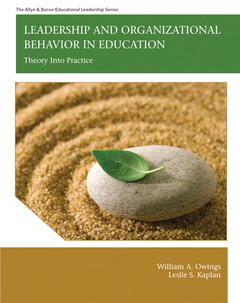Description
Leadership and organizational behavior in education (1st ed )
Theory Into Practice
Authors: Owings William, Kaplan Leslie
Language: English
Subject for Leadership and organizational behavior in education ...:
Approximative price 148.72 €
In Print (Delivery period: 12 days).
Add to cart576 p. · Hardback
Description
/li>Contents
/li>Biography
/li>Comment
/li>
Leadership and Organizational Behavior in Education puts theory into practice in a readable, teachable, relevant, and timely look at actual leadership behaviors through numerous case studies and personal experiences. Readers get a firm understanding of the information and how to relate it to their own personal experiences or transfer it to new situations. The author addresses a number of 'hot topics' in leadership and describes how to apply the concepts in actual work settings, now or in the future.
Prologue
Chapter 1. Historical Overview of Leadership's Role
Chapter 2. Historical Overview of Leadership in Organizations
Chapter 3. A New View of Leadership in Organizations
Chapter 4. Leadership Theories
Chapter 5. Leadership, Communication, and Vision
Chapter 6. Leadership and Motivation
Chapter 7. Leadership as Developing Capacity
Chapter 8. Leadership, Problem Solving, and Decision Making
Chapter 9. Leadership and Resource Allocation
Chapter 10. Formative and Summative Evaluation Issues in Educational Leadership
Chapter 11. Ethics, Integrity, and Social Justice in Leadership
Chapter 12. Developing a an Educational Leader
IndexWilliam A. Owings, Ed.D. has been an elementary and high school principal, assistant superintendent and school district superintendent and is currently a professor of educational leadership and graduate program director at Old Dominion University, Norfolk, Virginia. Together with his co-author, Leslie S. Kaplan, Owings has published texts including American Public School Finance (2006, Cengage), Best Practices, Best Thinking, and Emerging Issues in School Leadership, (2003, Corwin) as well as numerous book chapters and articles in professional journals including NASSP Bulletin, Journal of School Leadership, Journal of Education Finance, Teachers College Record, and Phi Delta Kappan. Professor Owings is editor of the Journal for Effective Schools and also serves on the editorial board for the Journal of Education Finance. A frequent presenter at regional and national conferences, he is a past-president of the Virginia Association for Supervision and Curriculum Development and served 20 years on the national ASCD Board of Directors. Owings and Kaplan were jointly awarded the 2008 Charles Edgar Clear Research Award from the Virginia Educational Research Association for “Consistent and Substantial Contributions to Educational Research and Scholarship.”
Leslie S, Kaplan, Ed.D. is a retired secondary school and central office administrator who currently researches and writes on educational issues full-time. She has been a successful school counselor as well as a central office and school administrator. Together with her co-author, William A. Owings, Kaplan has published books including American Education: Building a Common Foundation (Cengage, 2011), Effective Schools Movement: History, Analysis, and Application (2008, Intermont Center for Education Effectiveness), and Teacher Quality, Teaching Quality, an
- Focus on key concepts–each chapter explores key concepts from business, social sciences, and education regarding leadership and organizational behavior in education, giving students and professors a substantial yet manageable amount of relevant content.
- Presents traditional leadership and organizational behavior content specifically for educators–readers immediately see the relevance of key business and social sciences concepts to school-based contexts.
- Includes case studies on real, “hot topic” leadership and organizational behavior issues–readers see first hand how the concepts can be used to address and effectively resolve leadership issues in schools.
- Includes untraditional, but highly relevant, leadership and organizational behavior content giving readers the opportunity to consider often-overlooked topics.
- Presents opportunities for readers to analyze and use school data for school improvement–Included are documents containing student demographics and selected student, faculty, administrative, and community data.
- Provides research support, scholarly critiques, and strengths and weaknesses for many concepts–allowing readers to develop their own opinions of the concepts.
- Includes classroom, small group, and individual activities for each major concept–readers get a deeper understanding of the concepts and how to use them.
- Focuses on promoting practitioner growth–students learn the theory as well as how to apply it as educational leaders.



